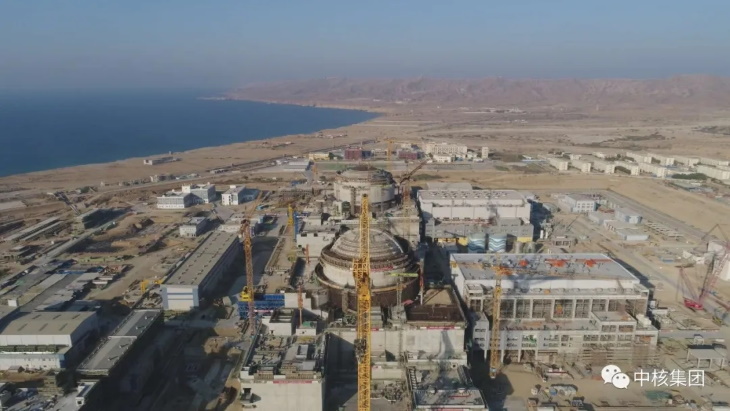Unit 2 of the Karachi nuclear power plant in Pakistan was synchronised with the electricity grid on 18 March. The Chinese-designed Hualong One reactor - the first of two to be constructed at the site - is scheduled to enter commercial operation by the end of this year. Karachi 2 and 3 are the first exports of China's Hualong One design, promoted on the international market as the HPR1000.

Karachi units 2 and 3 (Image: CNNC)
Omar Ayub Khan, Pakistan's federal minister For Power, Petroleum and Natural Resources, said in a tweet the reactor was connected to the grid at 9.37pm yesterday.
Karachi 2 and 3 are being constructed under a contract worth about USD9 billion signed between China National Nuclear Corporation and the Pakistan Atomic Energy Commission in 2013. Construction of unit 2 began in 2015 and unit 3 in 2016. Installation of the reactor internals of Karachi 2 was completed in January 2019, while installation of unit 3's was completed in April last year.
Cold functional tests, carried out to confirm whether components and systems important to safety are properly installed and ready to operate in a cold condition, were completed at Karachi 2 in December 2019. The main purpose of those tests was to verify the leak-tightness of the primary circuit. Hot functional testing, which involves increasing the temperature of the reactor coolant system and carrying out comprehensive tests to ensure that coolant circuits and safety systems are operating as they should, was completed on 4 September. Hot testing simulates the thermal working conditions of the power plant and verifies that nuclear island and conventional equipment and systems meet design requirements.
The process of loading a total of 177 fuel assemblies into the core of Karachi 2 began on 28 November last year. The reactor achieved first criticality - attaining an initial sustained chain reaction - on 28 February. Since then, a series of commissioning tests have been conducted.
Four Hualong One units - Fuqing 5 and 6 in Fujian province and Fangchenggang units 3 and 4 in Guangxi province - are expected to be connected to the Chinese grid by the end of 2022. Fuqing 5 was connected to the grid on 27 November, having achieved first criticality on 21 October, and entered commercial operation on 30 January. CNNC has also started construction of two Hualong units at the Zhangzhou plant in Fujian province, plus the first of two units at Taipingling in Guangdong.
General Nuclear Services - a subsidiary of EDF and China General Nuclear - proposes to use the HPR1000 at a prospective new nuclear power plant in Bradwell, England.
Researched and written by World Nuclear News